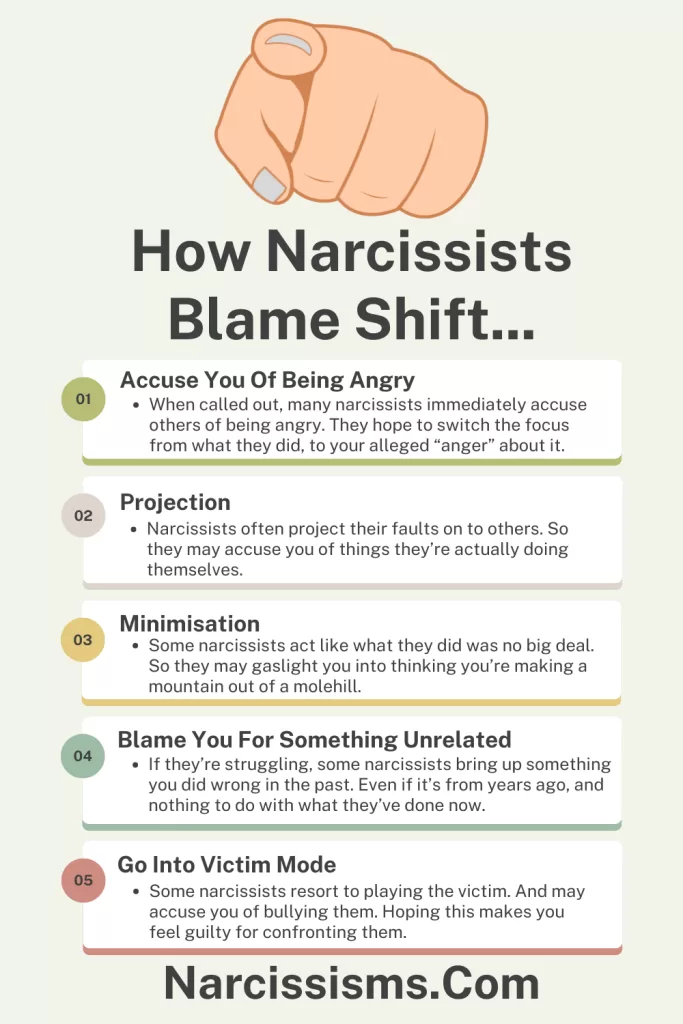Narcissists have delusions of superiority and perfection. And they fight hard to maintain their delusions.
As we all know, it’s impossible to be perfect and superior to everybody all the time. So narcissists find ways to kid themselves and others. And one favourite method is to shift blame from themselves, to you or others. Keeping their “perfection” in tact.
If the narcissist blames someone else, then in their mind it gets them off the hook. And often this tactic works. At least to some degree.
Most conscientious people naturally self reflect when blamed for doing something wrong. Even when there’s little merit in the accusations. And whilst they’re busy self reflecting, the narcissists behaviour is out the spotlight.
Narcissists know that if they blame someone, it sows at least a shred of doubt. Enough to get them confused and questioning themselves. Which often gains at least a “knock for knock” impression of mutual fault.
Here’s some of the ways I’ve seen narcissists shift blame onto others…
Please Check Out This Short Video To Aid Your Understanding…
Accuse You Of Being Angry With Them
A favourite of many narcissists is to counter blame by accusing you of being angry with them. Even if you’re calm and rational. You might for example ask them why they didn’t do something they promised. And in response they accuse you of being angry at them.
In this situation the narcissist WANTS you to be angry. Because things can descend into a toxic and messy argument, with no resolution. And that’s exactly what they want, because deep down they know they’re in the wrong.
Even if you don’t get angry, they change the topic of the discussion to be about your anger. And whilst you’re busy defending yourself, attention is taken away from what they’ve done. “I thought you promised to walk the dog?” “Why are you being so angry with me?”
Projection
Narcissists often project their flaws on to others. And they may do this before being caught out.
For example, a narcissist may accuse their partner of having an affair. When they’re actually cheating.
This pushes their partner on to the back foot. And focuses their mind on defending themselves, rather than recognising the narcissists’ suspicious behaviours.
It also gives them an excuse. Because the narcissist can blame their partners “affair” for why they had one in retaliation. Even though they weren’t even having an affair!
Say Nothing
When neuro-typicals wrong someone, causing a fall out, they usually apologise and try to make amends. I’ve noticed that narcissists often say nothing, and wait for the other person to approach them first.
They hope the other person tries to make amends. And holds out the olive branch, by apologising for their part in what happened. Even if they weren’t really to blame.
The narcissist may or may not apologise back. But even if they do, they’ve shifted the perception to things being of mutual fault. Rather than it being down to them.
Minimisation
Some narcissists act like what they did was no big deal. Which is gaslighting, and can cause a lot of confusion.
Once confused, the narcissist may turn the screw more. And accuse you of making a mountain out of a molehill. As if you’re wrong for calling them out!
Narcissists Distort The Truth
Many narcissists have a knack of bending the truth just enough to shift the blame onto others. The really skilful narcissists can do this without actually telling a lie. They somehow twist things to snugly fit the shape of you being to blame, and not them. Covert narcissists seem particularly skilled in this area.
The narcissist makes minor edits to history, which are difficult to dispute. And these minor edits are enough to change the whole complexion of what happened. And even if it’s not enough to get you accepting the blame, it’s often enough to convince others.

Recruit Backup
Narcissists often have a few “yes men” in their pockets. And may quickly hit them with their version of events, to sway their way of thinking. The narcissist then has backup when they want to shift the blame.
Narcissists often drop subtle hints to influence peoples’ perception of events. And persuade them of their distorted version of reality.
The person being blamed may feel the whole world is against them. Especially when several people share the same distorted view of reality. And although they feel in the right, they doubt their own perceptions. And wonder if it’s them going crazy, or the rest of the world.
Triangulate And Blame Someone Else
Triangulation is where the narcissist plays 2 or more people off against each other. The people being triangulated often have limited or no contact with each other. But the narcissist has plenty of contact with both.
This allows the narcissist to stir trouble between the two. And distort things the other has said or done. And they often use this position of power to pass blame.
If they have a dispute with one of them, they can find a way of blaming the other. And because they’re not around to defend themselves, it’s easily done.
Blame You For Something Unrelated
If a narcissist is feeling the heat, they might attack you for something completely unrelated. “Why were you over an hour late?” “Well what about you, knocking my drink over last week?”
It’s incredibly frustrating when they doggedly change the subject to something completely unrelated. Just to blame you for something. And even if you calmly and rationally change the subject back, they keep putting the spotlight back on you.
Narcissists hope this shifts the discussion to your behaviour. And provides a smoke screen for their own. When there’s blame flying around, that’s the one time narcissists don’t want to be in the spotlight!
Go Into Victim Mode
Particularly the more covert narcissists might go into victim mode. And cry, or hyper blame themselves. “You’re right, I’m just a stupid loser.” Or blame some sort of “illness”, such as depression , stress, or anxiety.
They hope to hit you in what they perceive is your “weak spot” – your empathy. If they make you feel sorry for them, they know you won’t have the heart to continue. And you’ll naturally back down from blaming them. And you might even share some of the blame in order to placate them.
Other narcissists may use victim mode to attack. They may accuse you of bullying them. And create the impression that you’re being cruel to them, for no reason.
Final Thoughts
Most narcissists fight tooth and nail to avoid responsibility for mistakes and bad behaviour. And they spend a life time developing ways to pass blame onto others.
It’s frustrating when a narcissist shifts the blame onto you or someone else. But you must remain calm and clearly state your case. Because a messy toxic argument never solves anything.
If you can find a way of stating your concerns without being accusatory, then the narcissist is less likely to shift the blame onto someone else. And as always, a compliment goes a long way with a narcissist.
For example, instead of saying “Don’t talk to me like that in front of people”, you could say “I know you’re a passionate person, but please can you rein it in when others are around?”
Whilst it’s not guaranteed the narcissist won’t still pass the blame, it gives you a better chance of getting your message heard.

Please CLICK HERE For Tips On How To Avoid Rising To A Narcissists’ Bait
Or Scroll Down For My Most Popular Posts (Mobile)…

How do I know that you are not a narcissist. My mother was and would have loved to appear to do what you are doing. I apologise if you are not but your blog would be right up a narcissists street.
Maybe I am a narcissist, I’ve never said I’m not!